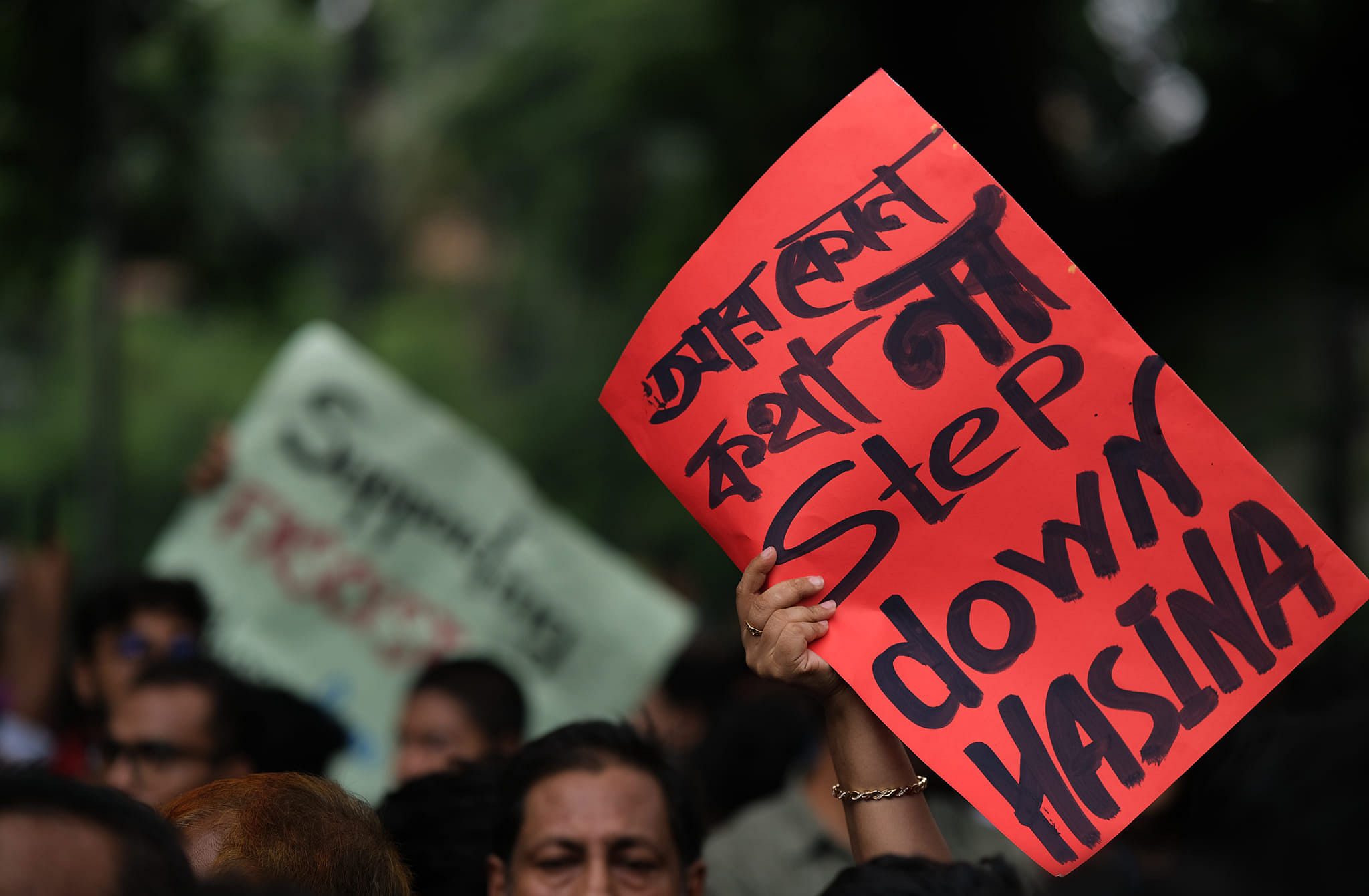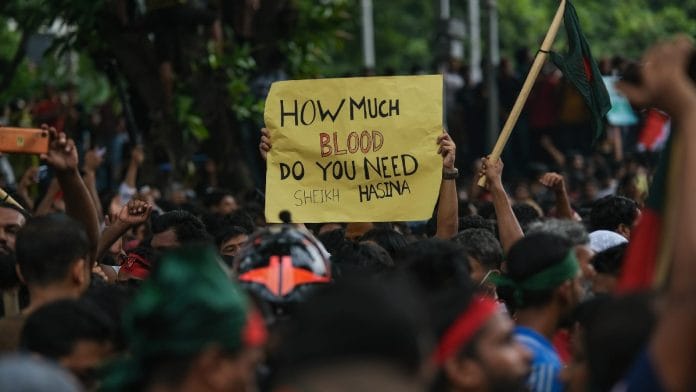New Delhi: It was a bloody Sunday in Bangladesh as protesters called for Prime Minister Sheikh Hasina’s resignation and clashed with the police and members of Chhatra League, the student wing of ruling party Awami League, leaving over 100 dead and dozens injured across the country.
Protesters who had hit the streets in June over quota reforms in government jobs, now have a single-point demand — they want Hasina to step down. Even as an indefinite curfew and three-day public holiday has been announced by the government, reports of attacks on the minority Hindu population came in from across the country.
A late-night advisory issued by the Indian Ministry of External Affairs strongly cautioned against travelling to Bangladesh till further notice.

Also Read: India confirms it received protest note from Bangladesh over Mamata’s offer to shelter refugees
‘Jamaat hand in violent clashes’
Sunday was the first day of the non-cooperation movement announced by the Anti-Discrimination Students’ Movement, the umbrella body that has been organising the protests that began in June this year. Members of the movement have decided to disobey any orders passed by the Sheikh Hasina government and not cooperate with the administration till the Bangladesh PM steps down.
Clashes between protesters and the police as well as members of the Chhatra League reported from Dhaka, Sirajganj; Feni, Lakshmipur; Narsingdi, Bogura; Sylhet, Magura and other places left over 90 dead and dozens injured, the Daily Star reported Sunday. Fourteen policemen were killed in the clashes. The report said the government has announced a three-day public holiday from Monday and ordered operators to shut down mobile internet. While Facebook and WhatsApp are inaccessible in many parts of the country, many shops and banks have remained closed in Dhaka.
Journalist Avijit Majumdar Hridoy told ThePrint over phone that some Hindu houses were attacked by protesters in Noakhali and Sirajganj districts, while a temple was vandalised in Panchagarh district.
The ruling Awami League claims this is not a students’ protest any more as Islamists have infiltrated the movement to aid the country’s principal opposition party, the Bangladesh Nationalist Party and Islamist party Bangladesh Jamaat-e-Islami.
“The Shariah-loving extremists are now attacking youth leaders, secular forces, and religious minorities. This needs to stop asap,” the Awami League wrote in a post on X.
As expected the #Islamists are deploying to aid #BNP #Jamaat #Shibir against #AwamiLeague in #Bangladesh. There is no #students protests anymore. The #Shariah-loving extremists are now attacking #youth leaders, secular forces, and religious minorities. This needs to stop asap.… pic.twitter.com/w2R0lolOP0
— Awami League (@albd1971) August 4, 2024
Journalist Shafiqul Alam put up a Facebook post saying the road in front of his office at Karwan Bazar in central Dhaka turned into a battleground Sunday. “Police and some alleged ruling party guys fired at the students-led protesters. Initially it was all teargas…Then after 4pm it was an all-out battle. It looked like we were in Gaza,” he wrote on Facebook.
Protesters have declared a long march to Dhaka Monday, the Daily Star reported. Journalist Sahidul Hasan Khokon, who has been covering the stir, told ThePrint over phone that the nature of violence that was unleashed Sunday has the imprint of the Jamaat’s militant wing.
“Hospitals being set on fire, policemen being beaten to death, burnt alive and the targeting of Awami League leaders, workers and supporters are not being done by student protesters. The Jamaat has infiltrated and hijacked the movement,” he said.
Sunday also saw the targeting of police stations and personnel. Bdnews24 reported that the most severe attack took place at the Enayetpur police station in Sirajganj, where 13 policemen were beaten to death. In Cumilla, 14 police personnel were killed and the number of injured police officers nationwide exceeded 300 in one day.
From quota reforms to demand for Hasina’s ouster
Anti-quota protests in Bangladesh began in 2018. The nationwide protests against reservation of 56 percent government jobs for certain groups, including 30 percent for the children and grandchildren of 1971 freedom fighters, eventually turned violent.
In the same year, after a government circular cancelled quotas for first- and second-class jobs, the protests had ended. On 5 June this year, the Bangladesh High Court ruled on a writ petition and said the 2018 circular was illegal, which meant quotas were to be brought back in government recruitments again. While the government appealed against the judgment, protests broke out in Dhaka and outside.
Things spiralled out of control after 14 July, when in response to a journalist’s question during a press meet, Hasina said: “Why do they (protesters) have so much resentment towards the freedom fighters? If the grandchildren of freedom fighters don’t get quota benefits, should the grandchildren of Razakars get them?”
The term ‘Razakar’ refers to a member of the East Pakistani volunteer force during the 1971 Bangladesh Liberation War. Razakars worked with the Pakistan Army in brutalising the local population through murders and rapes to prevent the creation of Bangladesh.
On 21 July, the Bangladesh Supreme Court reduced the controversial quota, lowering it from 30 percent to 5 percent after a week of violent protests roiled the South Asian country. However, after days of internet shutdown, curfew and a brutal crackdown by law enforcement agencies, protesters have moved on from asking quota reforms to demanding Hasina’s resignation.
The Bangladesh Army has urged all to comply with the rules of the curfew that has been extended for an indefinite period.
(Edited by Gitanjali Das)
Also Read: Are Bangladesh youth done with 1971 legacy? Anti-quota student protests question old ideas






